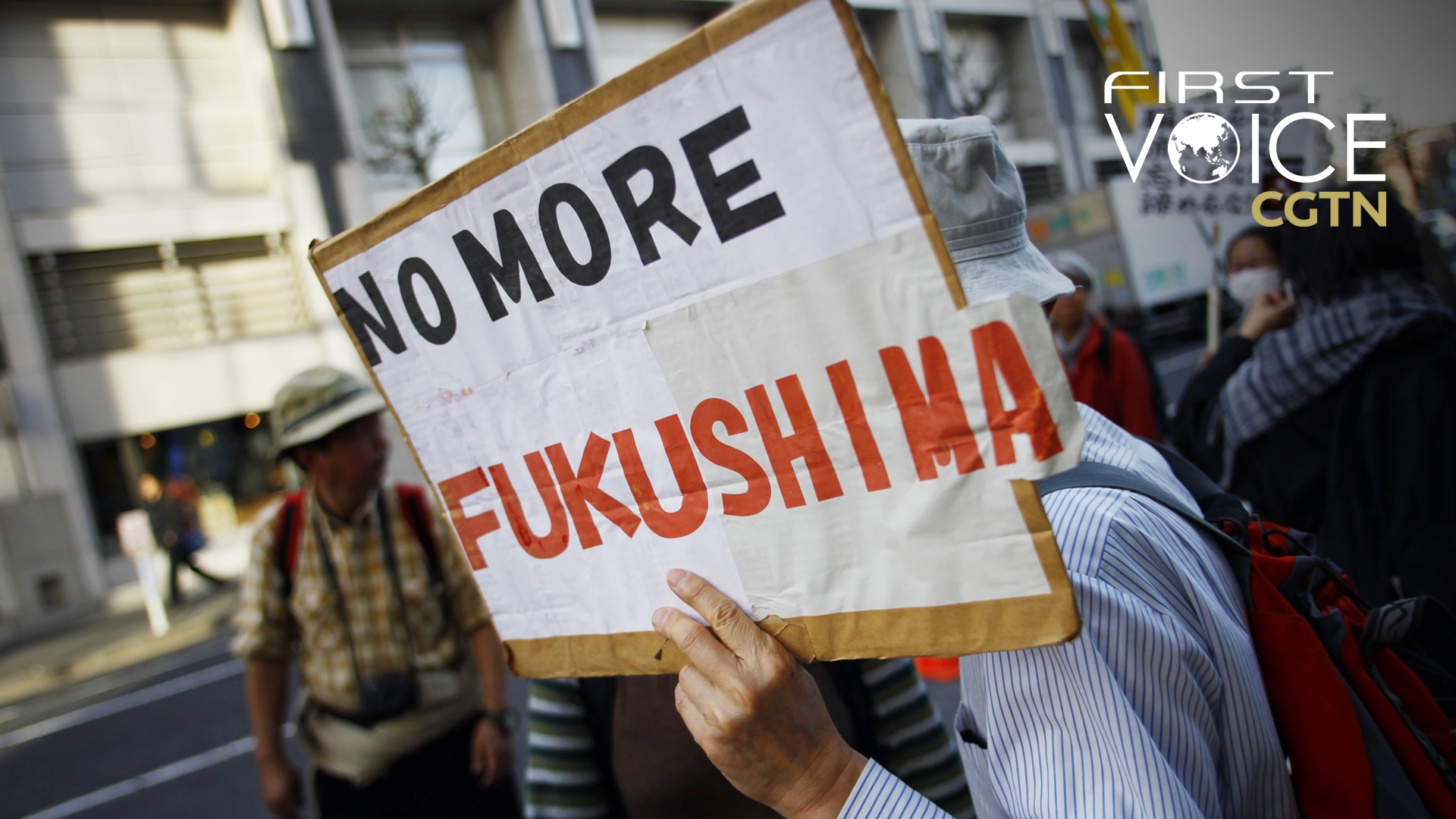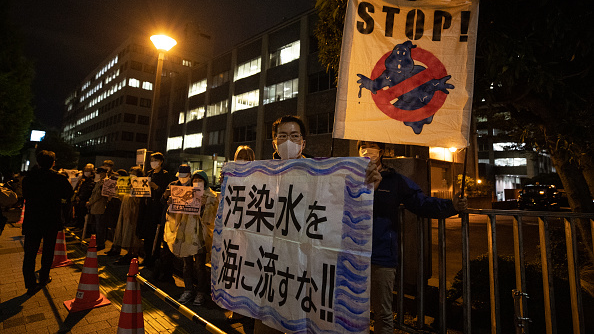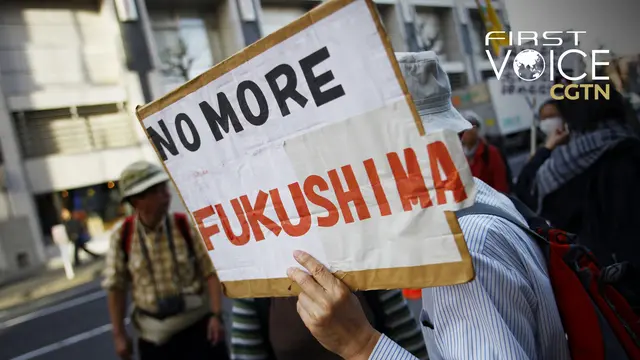
Editor's note: CGTN's First Voice provides instant commentary on breaking stories. The daily column clarifies emerging issues and better defines the news agenda, offering a Chinese perspective on the latest global events.
Japan is twisting facts, minimizing dangers and putting all life at risk for genetic mutations for thousands of years with its plan to dump more than a million tonnes of radioactive water into the Pacific Ocean.
It is doing this to shift the responsibility, danger and costs of the 2011 Fukushima Daiichi nuclear power plant triple meltdown from itself onto the whole of mankind. This is despite viable alternatives that leave the costs and dangers within its own borders.
Its neighbors, including South Korea and China, have condemned the selfish plan in the strongest language.
This diplomatic feud took a darkly comic turn last week, when the hypocritical Japanese Deputy Prime Minister and Finance Minister Taro Asodefended the country's Fukushima solution, saying the radioactive water is safe for drinking.
Chinese Foreign Ministry spokesperson Zhao Lijian pushed back – asking why Japanese politicians don't drink, cook and wash their clothes with the waste water.
Aso, pressed by reporters on whether he would drink the water, sidestepped the question, showing how hallow his soothing lies are.
This atomic-age anecdote shows that Japanese politicians have no problem calling the nuclear polluted water safe in order to save their government a few pennies – but are unwilling to bear the risks themselves that they so freely shift to the rest of the world.
Japan has viable alternatives of disposing the water. Announcing that it will slowly dump the water into the Pacific Ocean starting in 2023, the Japanese government has chosen the solution that is cost-effective and safest for itself but will put its neighbors' environment at risk.
Japanese officials, their American allies and the International Atomic Energy Agency have supported the decision, trying to muddy the waters by noting that dumping water used to cool nuclear reactors into the ocean is standard international practice.
In the words of IAEA Director General Rafael Mariano Grossi, "Releasing into the ocean is done elsewhere. It's not something new. There is no scandal here."
However, this is not a normal case of "releasing into the ocean." This is a unique and dangerous situation caused directly by one of the two worst human nuclear accidents in human history. It is different in kind from the regular operation of a nuclear reactor. The IAEA should be ashamed of making such a deliberately misleading, apples-to-oranges comparison.
The nuclear-contaminated water in Fukushima has fundamental differences from the discharge of a normally operated nuclear plant – in terms of the original source, the category of radionuclides it contains, and difficulties in treating the water. Containing a variety of radionuclides from the melted reactor core, the water is difficult to treat, China's Ministry of Ecology and Environment said.
According to a German marine scientific research institute, radioactive materials discharged from Fukushima could spread to most of the Pacific Ocean within 57 days from the date of discharge, and reach all oceans of the globe in a decade.

People demonstrate outside the prime minister's official residence in Tokyo, Japan, April 13, 2021. /Getty
Japan insists the water is safe for drinking after special treatment, Aso's refusal to do so aside. At present, the Japanese government is using the ALPS (Advanced Liquid Processing System) to filter out most of the radioactive elements. But the effectiveness of the ALPS system is in doubt.
In addition, it's worth noting that Tokyo Electric Power will filter the water and secure regulatory approval. But following years of leaks, malfunctioning equipment, safety breaches and spills, the company's credibility in handling the issue is shattered, even among Japanese people, who according to polls also oppose the plan.
If Japan were a responsible nation and shouldered its own responsibilities, it could use alternatives to get rid of the water that do not threaten the global ecosystem. These include vapor release, injection into rock strata far below the surface, and dumping the water into concrete pits that would then be sealed or combined with hydrogen and released into the atmosphere. These options will minimize negative environmental impacts on other countries, but they would mean higher costs for Japan and slightly higher risks for its people.
The Japanese government has "discounted the radiation risks and turned its back on the clear evidence that sufficient storage capacity is available on the nuclear site as well as in surrounding districts. Rather than using the best available technology to minimize radiation hazards by storing and processing the water over the long term, they have opted for the cheapest option, dumping the water into the Pacific Ocean," said Greenpeace Japan Climate and Energy Campaigner Kazue Suzuki.
China has strongly condemned Japan's decision to shift the burden from the Fukushima accident onto the rest of the world.
International treaties rule that polluters, not their neighbors, bear the responsibility for waste. But Japan has chosen to continue to rely on atomic energy by doing a calculus of its costs, benefits for carbon reduction, and safety risks.
China is not going to interfere in Japan's domestic affairs and second-guess its decision to use nuclear power. But it is important that Japan accept responsibility for its decisions, and not to shift consequences onto other nations to reduce its own costs.
Despite regular catastrophic earthquakes and tsunami throughout its history, Japan took a gamble on using cheap nuclear power. Its gamble failed horribly. The world must not let Japan shift the consequences for its mistakes from within its borders to the global ecosystem for millennia to come.
If Japanese are unwilling to drink this water, how can they force the rest of us to?
(If you want to contribute and have specific expertise, please contact us at [email protected].)
 简体中文
简体中文

